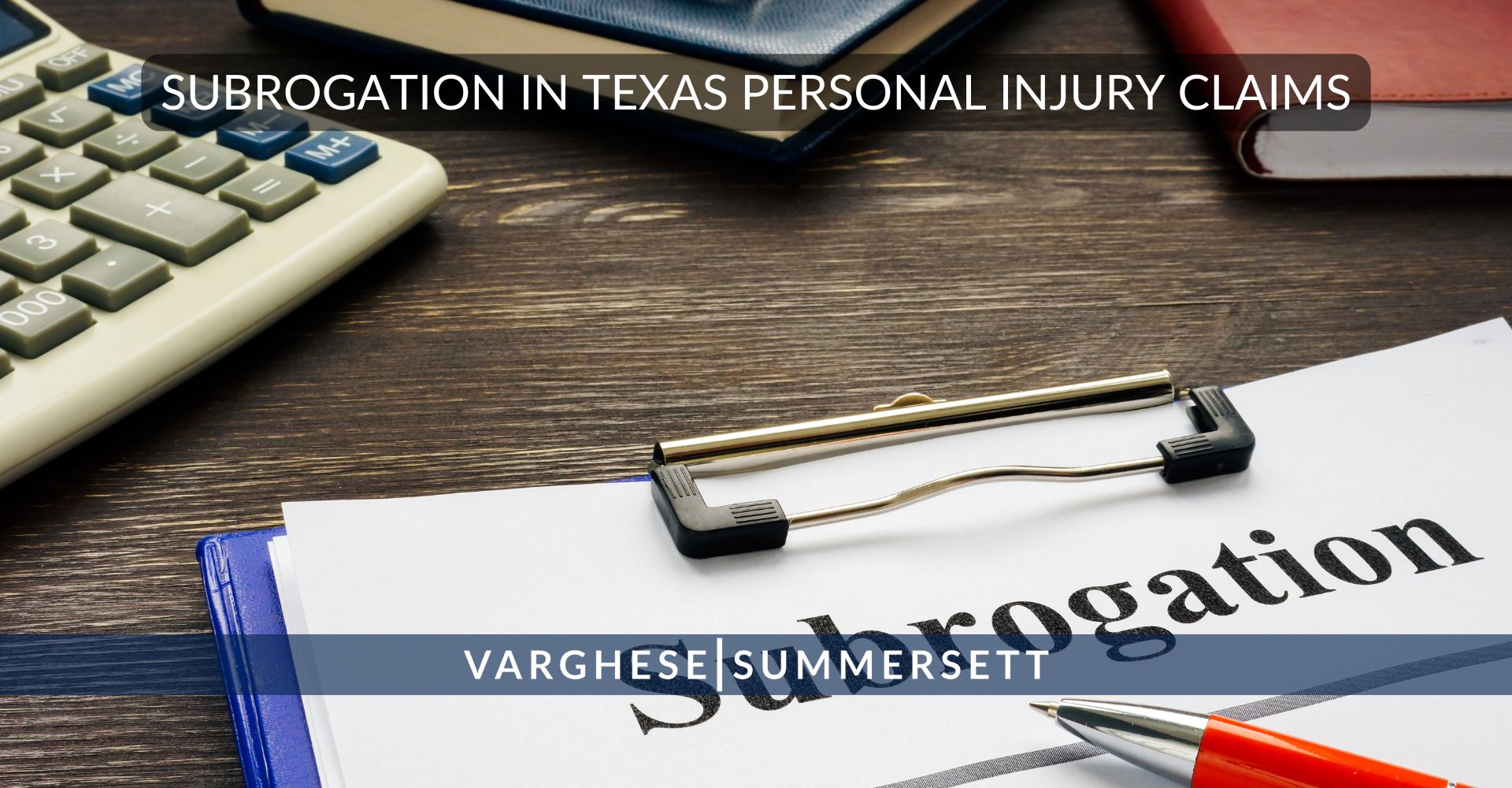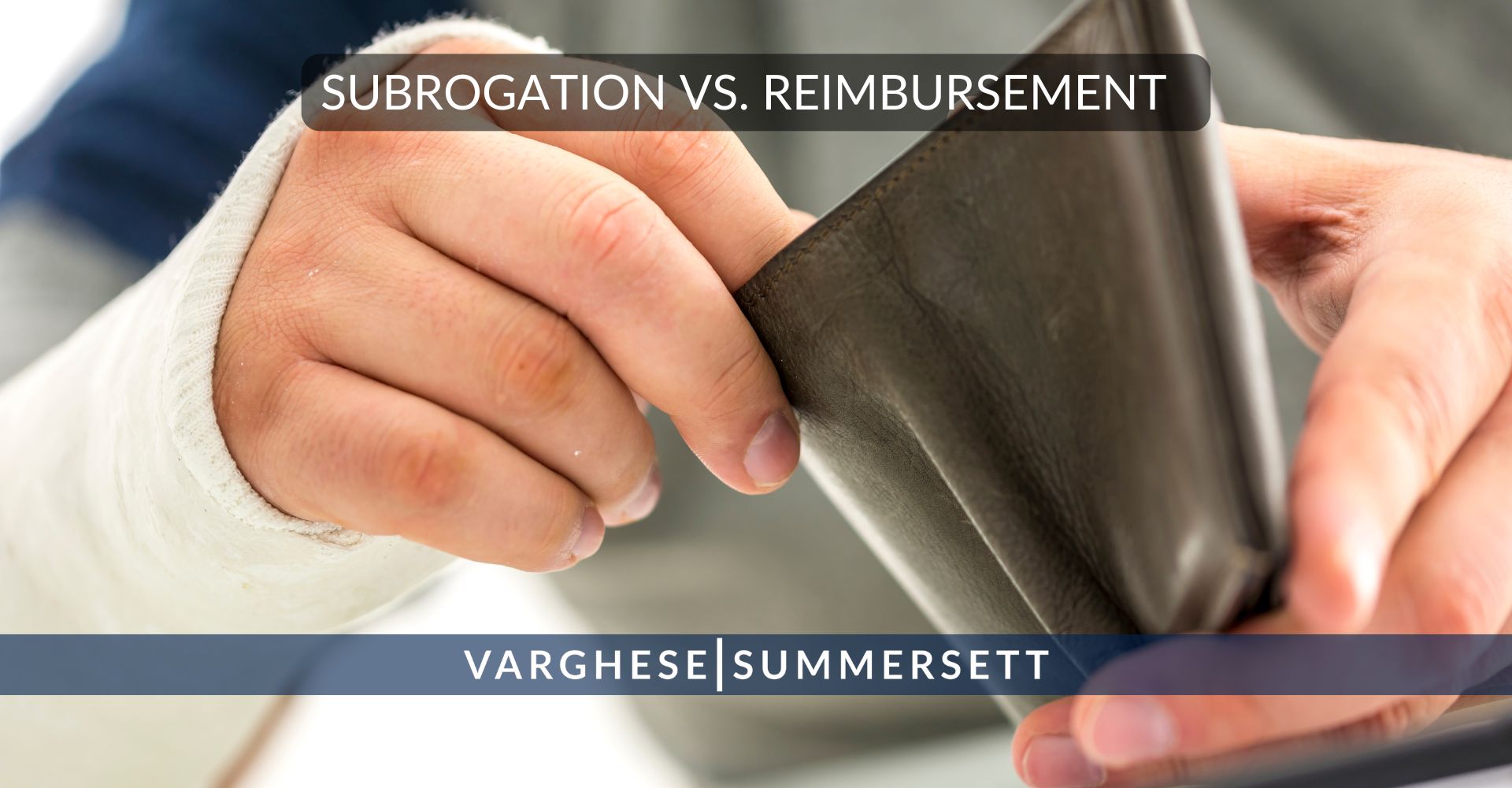When you’re injured in an accident, you may assume that any insurance coverage you have—health, auto, or otherwise—will take care of your bills without strings attached. But if another party is responsible for your injuries, your insurance company may seek repayment through a process known as subrogation.
In Texas, subrogation in personal injury cases can significantly impact the amount of compensation you receive. In this article, the personal injury attorneys at Varghese Summersett explain subrogation, how it could impact your settlement, and why an experienced attorney is vital in subrogation matters.

What is Subrogation in Personal Injury Claims in Texas?
Subrogation is a legal right that allows an insurance company to seek reimbursement for money it has paid on your behalf from a third party who is legally responsible for your loss. In the context of a personal injury case, this typically means your insurer wants to be paid back from the compensation you receive—either through a settlement or a court award.
Here’s a common example: Suppose your health insurance pays $15,000 in medical expenses after you’re injured in a car accident. Later, you receive a $100,000 settlement from the at-fault driver’s insurance company. Your health insurer may then assert a subrogation claim to recoup the $15,000 it paid for your treatment.
When an insurance company exercises its right of subrogation, it essentially steps into your shoes to pursue repayment from the person or party that caused the harm—most often the at-fault driver or their insurer. The primary goal is to shift the financial burden back to the responsible party and recover the funds the insurer advanced on your behalf, which may include medical bills, property damage, or other covered losses.
Subrogation can take different forms depending on the circumstances. Sometimes, the insurance company goes directly after the at-fault party or their insurer. However, more commonly, the insurer asserts its subrogation rights against you, the injured party, by placing a lien on your legal recovery. That means when you receive compensation, a portion of it may be earmarked to reimburse your insurance company for the expenses it already paid.
While this process helps ensure that the party at fault ultimately bears the financial responsibility, it can reduce the amount you actually take home from your settlement. That’s why it’s important to understand how subrogation works and how it may impact your personal injury recovery.
How Subrogation Works in Personal Injury Cases
Subrogation in personal injury cases comes into play after you receive medical care and your insurance company pays your bills. If a third party is liable for your injuries, your insurer may notify you of its intent to pursue subrogation. Once you receive compensation from the at-fault party—either through a settlement or court award—your insurer may demand reimbursement for the amount it paid on your behalf.
This is common in:
Subrogation typically occurs behind the scenes, but it can delay the disbursement of your settlement funds if not handled properly. In some cases, your attorney may need to negotiate with the insurer to reduce the reimbursement amount, especially if the total settlement is insufficient to cover all of your damages. Failing to address subrogation claims early in the process can lead to unexpected deductions and complications when it comes time to receive your share of the compensation.

Types of Insurance that May Assert Subrogation Claims
Several types of insurance carriers may have subrogation rights:
- Health Insurance: Private health insurers often include subrogation clauses in their policies.
- Auto Insurance: If your policy includes Personal Injury Protection (PIP) or Medical Payments (Med Pay), your auto insurer may seek reimbursement.
- Workers’ Compensation: If you were injured on the job due to a third party’s negligence, the workers’ comp insurer may subrogate.
- Government Programs: Medicare, Medicaid, and TRICARE have subrogation rights under federal and state law. These liens must be satisfied before funds can be disbursed.

Subrogation vs. Reimbursement: What’s the Difference?
While often used interchangeably, subrogation and reimbursement are distinct legal concepts—each with unique implications for personal injury claimants.
Subrogation occurs when your insurance company steps into your legal shoes and asserts a right to recover money from the party responsible for your injuries. In this scenario, the insurer may file a claim or take legal action directly against the at-fault party or their insurer to recoup the amount it paid on your behalf. You are not necessarily involved in the pursuit, but your insurer is acting based on your legal right to recovery.
Reimbursement, on the other hand, typically involves your insurer seeking repayment from you—specifically, from the settlement or court award you receive. Instead of pursuing the at-fault party directly, the insurer asserts a right to be paid back from your financial recovery. This often takes the form of a lien on your personal injury settlement.
In Texas, courts may treat these concepts differently depending on a number of factors, including the language in your insurance policy, the type of insurance plan involved (such as private insurance vs. an ERISA-governed plan), and applicable state or federal laws
Do I Have to Pay My Insurance Company Back?
If your insurer has a valid subrogation clause in your policy, the answer is usually yes. Ignoring a subrogation claim can result in legal action or delays in the release of your settlement funds.
However, the amount owed can often be reduced through negotiation, especially if:
- Your recovery is limited.
- You were not made whole.
- Your attorney assisted in securing the settlement.
How Subrogation May Affect Your Settlement
Subrogation can take a sizeable bite out of your settlement—and if you’re not prepared, the final amount you receive may be much less than you anticipated. When your insurance company asserts a subrogation claim, they are seeking repayment for the benefits they provided during your treatment. This repayment typically comes directly from your personal injury settlement or court award.
Let’s break it down with a simple example:
Settlement Breakdown Example:
- Total Settlement: $75,000
- Attorney’s Fees (33%): $25,000
- Subrogation Lien: $20,000
- Net to Client: $30,000
In this scenario, although the headline settlement amount is $75,000, your actual take-home amount is only $30,000 after legal fees and the insurer’s lien are paid. That can be a surprising and disappointing outcome for many injury victims who were counting on a larger recovery—especially if the settlement also needs to cover future care, lost wages, or non-economic damages like pain and suffering.
Fortunately, an experienced personal injury attorney can play a crucial role in protecting your recovery. Attorneys often negotiate with insurance companies to reduce subrogation liens, arguing factors such as the extent of the injury, the limited size of the settlement, or the degree to which the insurer benefited from the attorney’s efforts. In many cases, these negotiations can result in substantial reductions, putting more money back in your pocket.
It’s also worth noting that some liens—particularly those from government programs like Medicaid or Medicare—are governed by specific statutes and procedures. These require careful handling to avoid delays or legal complications, making skilled legal representation even more important.

Can Subrogation Claims Be Negotiated?
Yes—subrogation claims can, and often should, be negotiated. In many personal injury cases, your attorney can work to reduce the amount your insurance company seeks to recover, ultimately increasing your net settlement. Several legal doctrines come into play when evaluating and negotiating subrogation claims.
The Made Whole Doctrine (Texas Law)
Under Texas law, the Made Whole Doctrine holds that an insurer generally cannot enforce its subrogation rights unless the injured party has been fully compensated—or “made whole”—for all losses, including medical expenses, lost wages, and pain and suffering. In other words, your insurer typically has to wait its turn until you are completely reimbursed for your damages.
However, there’s an important caveat: this doctrine can be contractually waived. Many insurance policies—especially those governed by federal ERISA law—include language that explicitly overrides the Made Whole Doctrine. If the plan waives this protection, the insurer may be entitled to reimbursement even if you have not been fully compensated.
The Common Fund Doctrine
Another important principle is the Common Fund Doctrine, which may require your insurer to share in the cost of recovering the settlement. If your attorney’s efforts resulted in the financial recovery from which the insurer wants repayment, the insurer may have to reduce its lien by a proportionate share of your legal fees. This ensures that the burden of legal costs isn’t unfairly placed solely on you while the insurer benefits from the outcome.
Bottom Line
Subrogation claims are rarely set in stone. A knowledgeable personal injury attorney can evaluate your case, scrutinize the insurance plan language, and apply these doctrines to negotiate a more favorable resolution—helping you keep more of your settlement where it belongs: in your hands.
What Happens if I Ignore a Subrogation Claim?
Ignoring a subrogation claim is risky and can have serious financial and legal consequences. If you fail to address the claim, the insurance company may file a lawsuit against you to recover the money it paid, potentially dragging you into costly litigation. In some cases, they may delay or block the disbursement of your settlement until the lien is resolved. If the claim involves government benefits—such as Medicare or Medicaid—noncompliance can trigger penalties, interest, or even future benefit denials. Resolving subrogation claims promptly helps protect your recovery and ensures compliance with both legal and contractual obligations.

Tips for Dealing with Subrogation in Personal Injury Cases
Navigating a personal injury claim is challenging enough without the added layer of subrogation. Yet, understanding and addressing subrogation early in the process is essential to protect your financial recovery. Insurance companies are often quick to assert their rights to reimbursement, and if you’re not careful, a large portion of your settlement could end up going back to your insurer. Fortunately, with proactive steps and the right legal guidance, you can minimize the impact of subrogation on your case.
Here are some key tips to help you manage subrogation effectively:
- Hire a personal injury attorney early. Subrogation claims can be legally complex and full of fine print. An experienced attorney knows how to interpret insurance policies, apply relevant legal doctrines, and negotiate reductions.
- Request a copy of your insurance policy. Review it carefully, or have your attorney do so, to identify subrogation clauses or language that waives protections like the Made Whole Doctrine.
- Keep track of medical bills. Maintain detailed records of all medical expenses paid by you or your insurer. This documentation is crucial for validating or disputing a subrogation lien.
- Don’t settle without addressing subrogation. Before finalizing any settlement, ensure all subrogation claims have been identified and negotiated. Failing to do so can lead to legal action or withheld funds.
By staying organized, informed, and proactive, you can avoid costly mistakes and reduce the amount you may owe back to your insurer. Partnering with a knowledgeable personal injury attorney ensures that subrogation is handled properly—giving you the best chance of maximizing your settlement and moving forward with peace of mind.

Why a Personal Injury Attorney is Crucial in Subrogation Matters
Subrogation can significantly reduce your final settlement if not properly addressed. That’s why having an experienced personal injury attorney is essential. At Varghese Summersett, we take a strategic, proactive approach to protect your financial recovery. Our attorneys:
- Carefully analyze insurance policies for subrogation and reimbursement provisions
- Aggressively negotiate lien reductions with insurers and benefit providers
- Challenge improper, overstated, or unenforceable subrogation claims
- Ensure full compliance with Texas and federal laws, including ERISA and Medicaid/Medicare regulations
We’ve helped countless clients maximize their settlements by tackling subrogation issues head-on—before they become costly obstacles.
How Varghese Summersett Can Help
At Varghese Summersett, we understand that every dollar matters after a serious injury. Subrogation isn’t just legal jargon—it’s a critical part of the settlement process that can directly impact your financial future. We don’t just explain how subrogation works—we actively work to minimize its effect on your recovery.
If you’ve been injured and are concerned about how subrogation could affect your case, we’re here to help. Call us today at 817-203-2220 for a free consultation. Our team will fight to ensure you keep as much of your settlement as possible, so you can focus on what truly matters: healing and moving forward.
